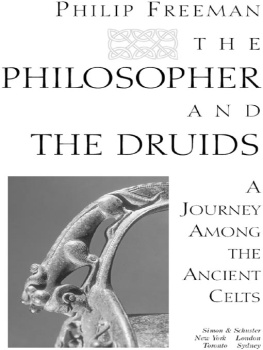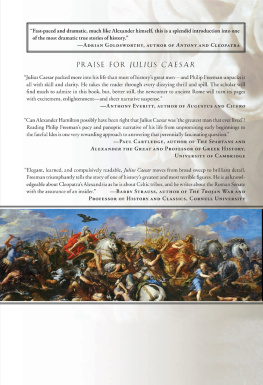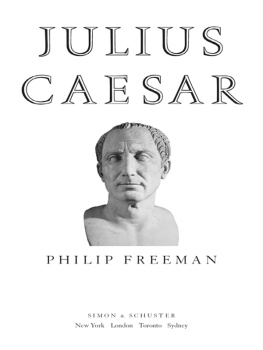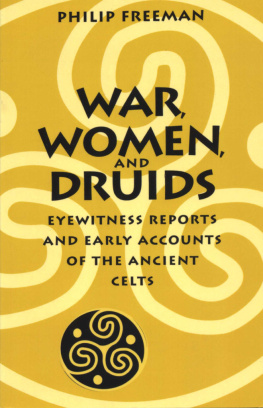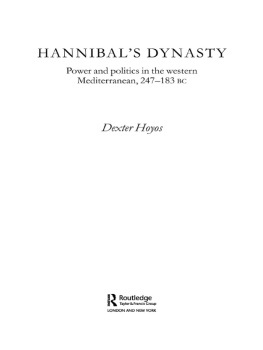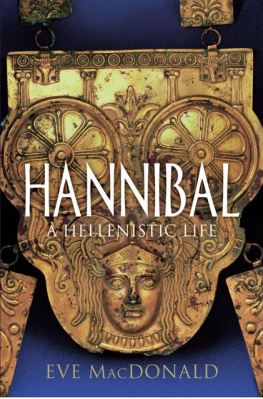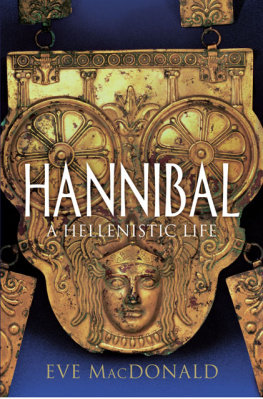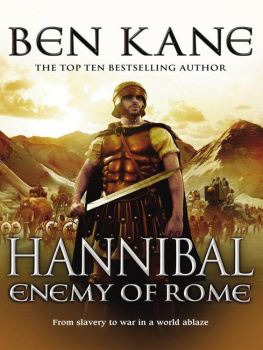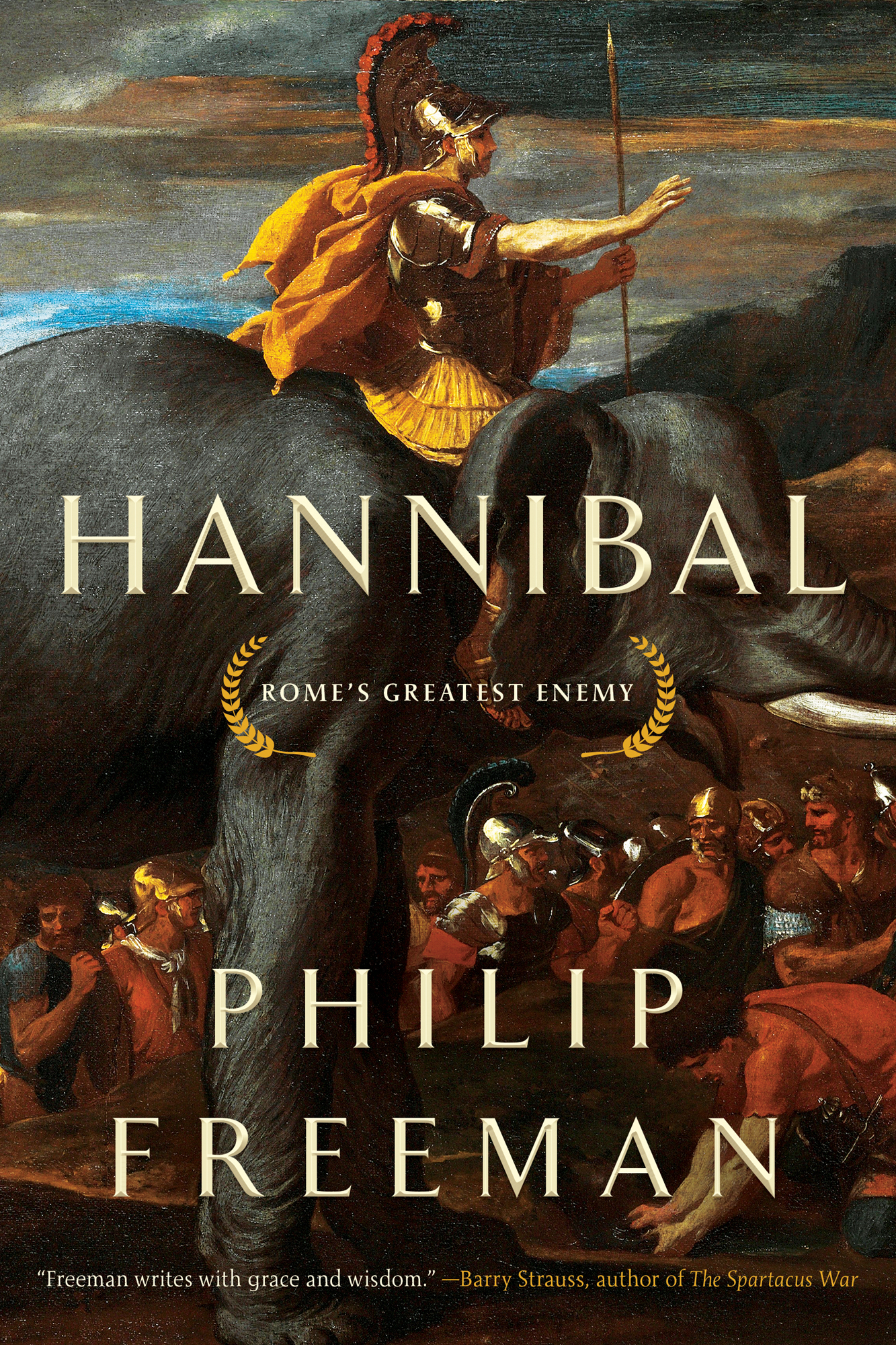Contents
Guide
Hannibal
Romes Greatest Enemy
Philip Freeman, PhD
Freeman writes with grace and wisdom. Barry Strauss, author of The Spartacus War
HANNIBAL
Pegasus Books, Ltd.
148 West 37th Street, 13th Floor
New York, NY 10018
Copyright 2022 by Philip Freeman
First Pegasus Books cloth edition February 2022
Interior design by Maria Fernandez
Jacket design: Faceout Studio, Spencer Fuller
Jacket imagery: Bridgeman and Shutterstock
All rights reserved. No part of this book may be reproduced in whole or in part without written permission from the publisher, except by reviewers who may quote brief excerpts in connection with a review in a newspaper, magazine, or electronic publication; nor may any part of this book be reproduced, stored in a retrieval system, or transmitted in any form or by any means electronic, mechanical, photocopying, recording, or other, without written permission from the publisher.
Library of Congress Cataloging-in-Publication Data is available.
ISBN: 978-1-64313-871-8
Ebook ISBN: 978-1-64313-872-5
Distributed by Simon & Schuster
www.pegasusbooks.com
PROLOGUE THE VOW
T he young African boy and his father walked up the cold stone steps of the temple in the hour just before dawn. The light rising from behind the distant mountains to the east beyond the wide bay was just beginning to spread across the city. He was only nine years old, but the boy had lived here all of his short life and knew every street and back alley. He had wandered every day from the pottery kilns and metalworking quarters on the edge of the massive city walls to the enormous central marketplace beneath the hill called Byrsa where merchants sold beautifully decorated Celtic daggers, necklaces of Baltic amber, Spanish silver, painted ostrich eggs from across the desert to the south, sweet Egyptian dates, Indian spices, the best Arabian frankincense, and even silk from distant Chinaall the treasures of the known world which flowed endlessly into the great port of Carthage.
His father, Hamilcar of the Barca clan, was the greatest general Carthage had ever produced, but the politicians and wealthy merchant families who controlled the town preferred negotiation and compromise to warfare. Hamilcar had watched in silent rage several years earlier as the Carthaginian adirim, or senate, had abandoned the ancient Punic colonies in nearby Sicily to the rising power of Rome. They had even agreed to pay the Romans an enormous indemnity in silver to buy peace. Hamilcar was now on his way to Spain to take over the rich mines of Iberia to help pay the heavy burden imposed on his city by Rome.
The father and his eldest son together entered the cool darkness of the great temple of Baal Hammon, chief god of Carthage. Baalthe Master or Lordhad come with the first colonists from Phoenician Tyre centuries before when they had sailed to the western Mediterranean in search of new markets and lands to settle. Stories said that Baal demanded a molk, or gift, of the firstborn child from each family. At the tophet, or sacrificial sanctuary, of Carthage near the harbor, the great outstretched metal arms of Baals statue received the child who rolled gently into the flaming pit at its base while the parents watched and the attendants played loud music to cover the infants screams. In recent years animals had sometimes taken the place of children, though the god could still demand a human victim.
But not today. This was a day for beginnings when Hamilcar would ask the god to favor his efforts across the sea in Spain. It might be years before he returned to Carthage, if ever. The priests sang the sacred prayers in the ancient Punic tongue, then cut the throat of the spotless lamb on the altar so that its blood covered the stone of sacrifice.
When all was done, Hamilcar asked the priests and attendants to withdraw so that he might speak to his son alone. The boynamed Hannibaal or Hannibal for he who enjoys the favor of Baalwaited for the others to leave, terrified at what his father might say, or not say. More than anything in the world he wanted to go with him to Spain and learn the arts of war so that he, too, might one day fight for his city. Much to his relief, Hamilcar looked down at his son with a smile on his face and asked the boy in an offhand way if he might like to accompany him across the sea. Hannibal was overjoyed and hugged his father tightly, saying it was his greatest wish.
Then the look on Hamilcars face changed. In deadly earnestness he told the boy to put his hand on the still-warm body of the lamb on the altar and swear a most solemn oath before Baal and all the gods. If Hannibal were to sail with him to Spain to become a soldier for Carthage, he must first vow eternal hatred towards Rome, never yielding in his anger and never giving up the fight until his final breath.
Hannibal had been raised since birth on bitter enmity towards the Romans and did not hesitate for a moment to take the vow his father demanded. No matter what the gods held in store for him in the years ahead, he would dedicate his life, his very soul, to fighting against the most powerful and relentless enemy of Carthage.
T he story of Hannibal that began with a young boy in a Carthaginian temple has gripped the imagination of the world for over two thousand years, beginning with the Romans who delighted in seeing the African leader as the embodiment of the supposed barbaric, uncivilized enemies they faced on all sides and whom they longed to conquer. But the fact that Hannibal was one of the most brilliant and daring generals in world historyand the man who almost destroyed Romewas impossible even for the Romans to ignore. What kind of person would dare to lead his struggling homeland in a war against the most relentless military power the ancient world would ever know? How could he conceive and then actually carry out his audacious plan to march his army over the towering Alps to carry his war into the very heartland of Italy? And how could Hannibal, consistently outnumbered and always deep in enemy territory, defeat Roman army after Roman army that was sent against him until he held the very fate of Rome within his grasp?
Hannibal appeals to many as the ultimate underdoga Carthaginian David against the Goliath of Romebut it wasnt just his genius on the battlefield that set him apart. As a boy and then a man, his self-discipline and determination were legendary. As a military leader, like Alexander the Great before him and Julius Caesar after, he understood the hearts of men and had an uncanny ability to read the unseen weaknesses of his enemy. As a commander in war, Hannibal has few equals in history and has long been held as a model of strategic and tactical genius studied in military academies even today. But Hannibal was much more than just a great general. He was a practiced statesman, a skilled diplomat, and a man deeply devoted to his family and country.
Like so many others, I remember as a boy reading with fascination the story of Hannibal leading his battle elephants over the Alps and defeating the unbeatable Romans in a seemingly hopeless war to save his country. But I long wondered: Who was the man behind the legend? What can the stories we have of himalmost all from hostile Roman sourcestell us about the real Hannibal? How does the story change if we look at Hannibal from the Carthaginian and not the Roman point of view? Can we search beneath the accounts of Roman historians like Livy who were eager to portray Hannibal as a monster and find a more human figure? Can we use the life of Hannibal to look at the Romans themselves in an unfamiliar way, not as the noble and benign defenders of civilization familiar from modern history books but as voracious, ruthless conquerors motivated by greed and imperialism?


